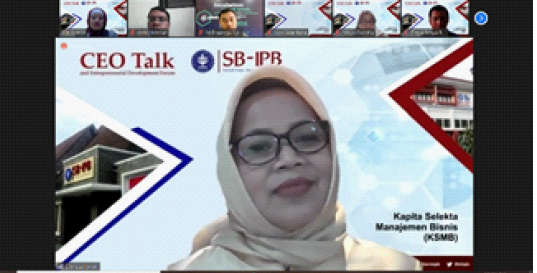
Renewable Energy
On 20 October 2020, Mrs. Etty Susilowati agreed to share in the R63 and R64 Class R63 and R64 Capita Selecta Management and Business (KSMB) regarding Renewable Energy. He is the President Director of PT Jasa Tirta Energi as well as the commissioner, co-founder of PT Puri Lupine Indonesia, and PT Lupine Mitra Bakti Nusantara. Previously, he worked at Lupine Food Australia, PT Frontliner Indonesia, PT Amanu Bina Citra, PT PNM, and others. He completed his S1 from Trisakti University, S2 from UI, and S3 from SB-IPB University.
PT Jasa Tirta Energi (JTE) is a state-owned subsidiary of Perum Jasa Tirta I. JTE has two divisions, namely the energy division and the general services division. The energy division is one of the divisions assigned the task of developing the potential for water resources in the working area of Perum Jasa Tirta I into electrical energy. Meanwhile, the public services division has developed for more than 15 years in the fields of dredging, steel sheet pile (SSP) pulling out, heavy equipment rental, SSP rental, and water resources infrastructure management.
With the limitations of fossil energy, new and renewable energy (EBT) has become important alternative energy. The national energy policy targets NRE for around 23% of Indonesia’s total primary energy by 2025. EBT consists of various types such as solar, water, wind, geothermal, biomass, hydrogen, and nuclear power. Biomass can consist of biogas, bioethanol, biodiesel, bio charcoal, and organic waste. The priority of national energy development is maximizing the use of renewable energy, minimizing the use of petroleum, optimizing the use of natural gas and new energy, using coal as a mainstay of national energy supply, and utilizing nuclear as a last resort.
Currently, JTE is developing various power generation businesses that come from water, solar, wind or wind, and biomass such as biodiesel. There are still many potential new and renewable energy sources to be developed.
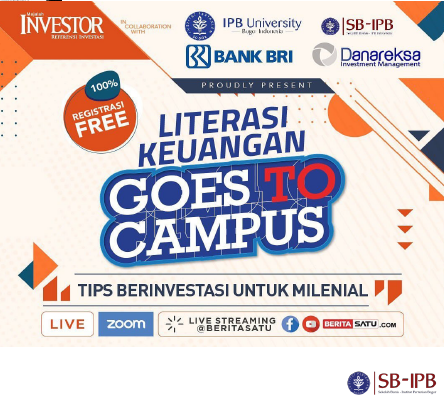
Financial Literacy Goes To Campus, Investment Tips For Millennials
IPB University Business School (SB-IPB) and IPB University are collaborating with Berita Satu Media Holding, the Financial Services Authority (OJK), Bank Rakyat Indonesia (BRI), and PT Danareksa Investment Management to hold a financial literacy event goes to campus which is held regularly online on Thursday (15/10). Raising the topic “Investment Tips for Millennials”, this event was attended by 550 people in the Zoom meeting room and 1424 people listening through the live streaming of the Berita Satu Youtube account. The webinar activity does not only run in one direction, participants actively participate in discussion sessions, quizzes, and the Instagram repost challenge which prizes various interesting door prizes.
The SB-IPB financial literacy activity goes to campus presented a keynote speaker, Member of the OJK Board of Commissioners for Consumer Education and Protection, Tirta Segara, SE, MBA. Other speakers at the panel discussion were also presented, including 1) Executive Vice President of Wealth Management Division of BRI, Tina Meilina, CWM, CFP; (2) President Director of Danareksa Investment Management, Marsangap P Tamba, MSc; and (3) Dean of the IPB Business School, Prof. Dr. Ir. Noer Azam Achsani, MS. Vice Rector for Education and Student Affairs of IPB University, Dr. Ir. Drajat Martiato, MSi represented the Rector of IPB to give a speech. The event was opened by Poppy Zeidra as the host followed by singing again Indonesia Raya, opening speech, presentation of material, followed by a panel discussion moderated by News Director BeritaSatu Media Holdings, Primus Dorimulu.
While fighting the health crisis and returning the wheels of the economy due to the Covid-19 pandemic, financial literacy is believed to play a strategic role in the country’s economic recovery. “Millennials are currently 1/3 of Indonesia’s population with the main characteristic of being dependent on the internet and gadgets. Millennials who have set aside funds from their income for new investments are 2%. The financial challenges faced by millennials include lifestyle pressures, lack of knowledge about finance, and a lot of forests and wasteful experience to gain ”. Said Tina.
Tirta Segara explained five reasons why the habit of saving and investing should continue to be instilled in millennials from an early age, including 1) millennials are the nation’s next generation, 2) low levels of financial literacy according to the OJK survey, 3) more vulnerable financially, 4) no prepare an emergency fund, and 5) alert illegal investments. Investing is often seen as something scary, but it can be easier to understand if you understand the basic principles of investing, namely planning, execution, and monitoring. Tirta shared investment tips for millennials, “Investing for millennials can be done by understanding the character and financial condition, recognizing investment products, starting small, diversifying investments, not getting emotional, and ensuring 2L Legal and Logical”.
“Investments need to be planned with specific goals, such as investments with plans to buy a house, education costs, etc. Choosing an investment product is also a plan, to match the goals and abilities of millennials when they first invest. After making a plan, execute! Invest by the predetermined plan and monitor investment developments intensively to find out what steps can be taken in the future. Investment plays an important role in protecting the value of money, uncertainty in the future, and retirement plans, “said Tina.
“Smart tips for managing finances for millennials are allocating their income with a 4-3-2-1 formula, 40% for daily needs, 30% for debt needs, 20% for investment and insurance needs, and 10% for social needs. spending priorities, try to only have ‘good debt’, determine your investment goals, understand the financial products, don’t forget to prepare an emergency fund, then start investing and buying insurance products because we need protection, take advantage of the ‘auto-debit’ account facility, and must be disciplined in managing finances. ” Tina explained that she shared tips on managing finances for millennials.
Investment is a solution to more optimal financial goals. Marsangap suggested, “Mutual fund investment can be used as an easy-to-reach investment alternative for novice investors”. Finally, Prof. Dr. Ir. Noer Azam Achsani, MS explained tips on investing in the real sector. Furthermore, Okty Shalihati shared tips for budding entrepreneurs to obtain funds from investors. “Tips to convince investors, make a proper pitch deck flow for the session and master the discussion session”.
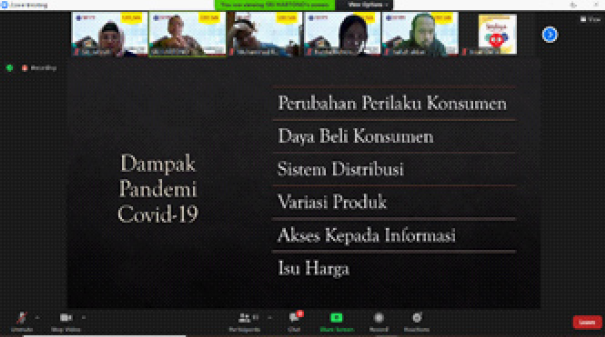
Driven Strategy: Understanding Markets and Consumers During the Pandemic
On October 15, 2020, Dr. Ir. Sri Hartono MM, CMA, CHRA would like to share his experiences with students of the SB-IPB Undergraduate Program. He is the CEO of PT Catur Pilar Jaya and the CEO of PT BMS Group, a trainer and management consultant as well as teaching at Postgraduate SB-IPB, UMB, and UNPAK. He has experience working in various multinational companies such as PT Meiji Indonesia, PT Sandoz Indonesia, PT Casana Prima, PT SLH Prima, and PT GlaxoSmithKline Indonesia. He delivered material on Market Driven Strategy: Understanding Markets and Consumers During the Pandemic.
The market during the Normal vs New Normal period, which under normal conditions is demanded to be focused, consistent, the best marketing strategy, flexibility, and high competition. During the New Normal period, there were four mega shifts, namely, stay at home lifestyle, the bottom of the pyramid, go virtual and empathic society. The impact of the Covid-19 pandemic is changing in consumer behavior, consumer purchasing power, distribution systems, product variations, access to information, and price issues. There are four characteristics of a market-driven strategy, namely becoming market-orientation, determining distinctive capabilities, customer value/capabilities match, and achieving superior performance.
These four things are like a rotating cycle.
Six practical steps to retaining customers you can take are to change the mindset, listen to the customer, follow their line of thinking, make connections, recommend your solution as a match, and exceed expectations above and beyond expectations. First, changing the mindset can be done with a focus on customers, creating value and innovation is a necessity. Second, listen to customers by being good listeners, rejection is an opportunity, and remember that customers are unique. All three follow their path by simply following, refining existing ones, and being more flexible.
Fourth, make a connection by taking advantage of all access, being creative is not enough, make sure you are connected and don’t be lazy. Fifth, your recommendation as a suitable solution through being an expert, mastering product knowledge, and meeting customer expectations. Finally, go above and beyond expectations by giving your best, be the first, and don’t be stingy.
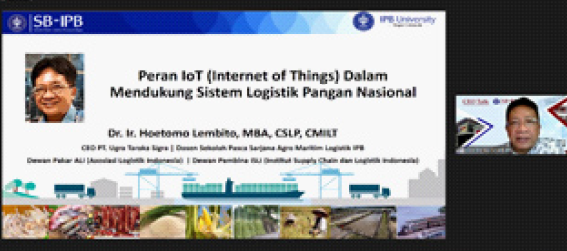
The Role of IoT (Internet of Things) in Supporting the National Food Logistics System
Kapita Selecta Management and Business (KSMB) Class R63 & R64 on October 13, 2020, Mr. Hoetomo Lembito wishes to share about the role of IoT (Internet of Thing) in Supporting the National Food Logistics System. He is the CEO of PT Ugra Takara Sigra, the Board of Experts of ALI (Indonesian Logistics Association), the Board of Trustees of ISLI (Indonesian Institute of Supply Chain and Logistics), and a Lecturer at the Postgraduate School of Agro Maritime Logistics IPB University. He completed S1 from IPB, S2 from PSBA (Philippine School Business Administration), and S3 from SB-IPB University.
The national food system is built with the spirit/foundation of food sovereignty and self-sufficiency, performance measures seen from national food security in which there is food security, the outcome is that individuals and communities can live healthy, active, and productive lives sustainably. The impact of Covid-19 on national resilience is the disruption of agricultural production due to restrictions on the movement of people/labor, a decrease in people’s purchasing power of demand for agricultural products, disruption of food distribution due to the implementation of PSBB, and limited area closure, farmers vulnerable to Covid-19, the potential food crisis, and threats to the availability of national food stocks originating from imports such as wheat, sugar, beef, garlic, and soybeans. The policies and programs of the Ministry of Agriculture are to increase the productivity of staple foods, facilitate food distribution, facilitate access to transportation, maintain price stability, and develop and intervene in markets.
The target is an increase in farmer exchange rates.
The national logistics system has been built based on supply chain management, the paradigm of “ship follows the trade and ship promote the trade” and uses an approach of six key logistic drivers (six key drivers). The six key drivers of logistics are commodities, infrastructure, actors and service providers, human resources, ICT, and regulations. The national logistics network is built with the integration of local and national networks as well as global network connections.
Information technology and digitalization have entered all aspects of life. The focus of the logistics strategy with IoT is last-mile distribution (responsiveness), strengthening the flow of goods from rural areas, between islands and IKM clusters (efficiency), as well as modes of transportation and warehousing (responsiveness and efficiency). The conventional food and agro logistics system is required to become a high-precision food and agro logistics system (smart, adaptive, and resilient) by utilizing ever-evolving information technology. So, the food supply chain will be transformed with Blockchain and IoT
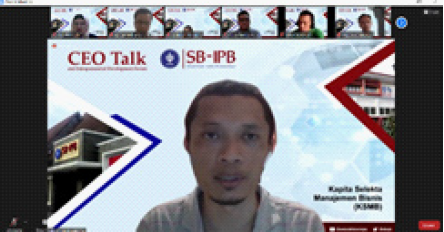
Managerial Experience of Electricity Business Development in Multinational Companies
At the Kapita Selekta Management and Business (KSMB) Masters Study Program Class E72 on October 10, 2020, presented a speaker Mr. YB Andhi Marjono, PhD who shared his managerial experiences in developing electricity business in multinational companies. Currently, Mr. Andhi is a Business Development Director at Electricite de France, previously he worked at several companies such as Worley Parsons in Jakarta, Schlumberger R&D in Japan, Schlumberger Middle East in the UAE and Saudi Arabia, and Adaro Power in Jakarta. He completed his S1 from ITB and S3 from Tokyo University of Electro-communications in Japan in Mechanical Engineering and Intelligent Systems.
Mr. Andhi shared his experiences in various situations by taking into account the strength of his scope, consisting of emotional, relational, execution, and thinking. While working as a physicist engineering in Tokyo for three years, mostly in the laboratory, he emphasized the importance of critical thinking and creativity, especially to think out of the box. From life in the laboratory to the field in the UAE and Saudi Arabia demands strong emotional control and resilience. Cultural differences and field activities that require a good physique have forged him to become a tough figure. When he returned to Japan and became a technical project leader, having to deal with experts from various fields required him to have strong relationship building and collaboration.
Electricite de France (EDF) which is the world’s leading electricity company. This company covers all businesses in the electricity value chain from generation, distribution, energy transmission, and even trading activities. EDF is a producer of renewable electricity in Europe. He is currently at EDF Indonesia and focuses on renewable energy which presents its challenges to further highlight all the strengths of his strength scope.
From these experiences, he gave messages to focus on our strengths, how to continue to hone our strengths. Sometimes we focus more on weaknesses and try to eliminate weaknesses that cause our strengths to become dull.
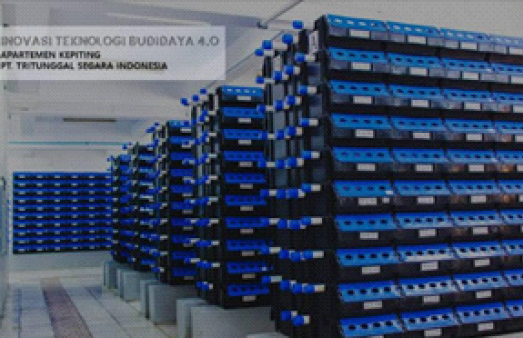
Crab Business with Technology Innovation 4.0 Crab Apartments
On October 8, 2020, the IPB University Business School successfully presented Mr. Hendra Sugandhi in the CEO & Leadership Forum for the Bachelor of Business Program. Mr. Hendra is the Managing Director of PT Tritunggal Segara Indonesia. On this occasion, he shared a lot of experiences and education related to the crab business. In more detail, he conveyed about the crab business with technological innovation 4.0 or it can be said as the Crab Apartment.
Mr. Hendra Sugandhi said that on September 28, 2018, PT Tritunggal Segara Indonesia collaborated with IPB University to develop a research and cultivation fishery business model, especially the crab apartment at IPB Fisheries and Marine Observation Station (IFMOS) Ancol. The Crab Apartment is the result of developing technological innovations in vertical crab cultivation. By placing it vertically, it turns out that there are many advantages and benefits, including saving land; prevent cannibalism and predators; more effective and efficient feeding; hygienic; faster crab growth; and water management is maintained and controlled.
In the end, Mr. Hendra provided data information that could be used as business opportunities, especially opportunities from the crab business. Why the crab business? Indonesia has high potential because it has extensive mangrove forests. Total demand and high export prices. The length of time for cultivation is relatively short. Indonesia is the 5th largest crab exporting country in the world.
Not only humans own apartments, but crabs too.
What have learned from this CEO & Leadership Forum is to research so that we know what to do in the future and minimize risks, the second thing is to learn how to collaborate well and know the business flows that can support our business going forward.

7 Habits of Highly Effective People Training
IPB University’s Business School and IPB University’s Human Resources Directorate have held a “7 Habits of Highly Effective People” Training for IPB University Education Personnel from 29 September 2020 to 02 October 2020.
This training is expected to provide a comprehensive understanding of IPB University Education Personnel on how to maximize their potential, both for professional and personal interests.
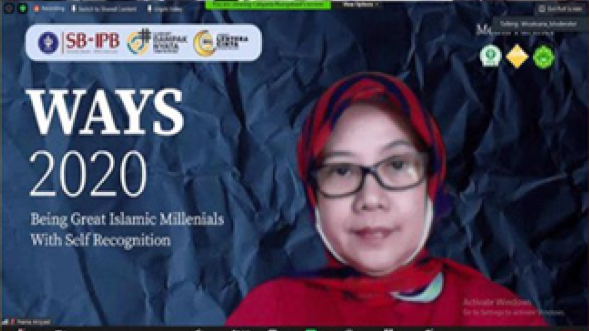
WAYS (Wonderful Achievment for Young and Special Generations) 2020
The role of youth in building Islamic civilization has been undoubted since the time of the Prophets. Becoming such a great person certainly has its challenges, especially for millennials in this digital era. When a Muslim youth wants to take part in the struggle for da’wah and take part in society, he should be able to identify more deeply about himself and what Islam is more deeply about. Then, how can a young man know himself and Islam more deeply? What is the importance of this? How are the steps of the youth today when they want to take a role in society?
On Sunday, October 4, 2020, WAYS (Wonderful Achievement for Young and Special Generations) 2020 was held to discuss this issue. WAYS 2020 is a joint work program between BEM SB-IPB and Rohis SB-IPB Family. This event was packaged in the form of a webinar with the theme “Being Great Islamic Millennials with Self Recognition” and was attended by 138 participants from various regions. This activity was guided by Bhirawa Ananditya Wicaksana, Chair of BEM KM IPB 2019/2020, as a moderator and presented two great speakers. The first speaker at this event, namely Habib Husein Ja’far Al Hadar. He is a preacher, well-known writer, and caregiver of “Kultum Pemuda Tersesat”. Then, the second speaker at this event was dr. Gamal Albinsaid, M.Biomed. He is a doctor, health innovator, social entrepreneur, and also an inspiration for Indonesia’s pride. He is the CEO of Indonesia Medika and has received many awards both domestically and internationally.
In the first discussion, Habib Husein Ja’far Al Hadar explains how the basics of the teachings of Islam are. He explained about prayer in Islam, amar ma’ruf nahi munkar, and other daily worship. Then, the most important thing is how we can stay istiqomah in carrying out this daily practice and try to maintain the quality of our faith. Furthermore, dr. Gamal explained how Muslim youths can identify themselves, optimize their potential, and take part in society. dr. Gamal talked a lot about the various experiences he had gone through. He told the story of seeing a scavenger child who died in his father’s cart due to illness and was unable to seek treatment which eventually motivated him to develop various health innovations. Then dr. Gamal explained how youths take part in society, one of which is through social entrepreneurship. If you follow your passion, money, people, and impact will follow you (Gamal Albinsaid).
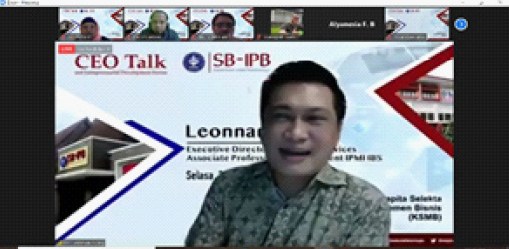
Crucial Conversation in Practical Approach
On 29 September 2020, Associate Professor Dr. Leonnard Ong, who is the Executive Director of Frontliner Services and also a lecturer at IPMI International Business School, filled the Kapita Selekta Management and Business (KSMB) class with the title “Crucial Conversation: Practical Approach”. Dr. Leonnard Ong completed his S3 from SB-IPB, while the Master of Commerce from the University of Sidney and the Master of Business Administration from The New York University. He has also participated in various executive programs and courses in Europe, Australia, China, and other countries.
The crucial conversation that is delivered is divided into two, namely intra personal and inter personal communication skills. First, intra-personal communication skills emphasize understanding yourself with four self-awareness sources. The four ways of seeing yourself are (1) others’ images through how other people see me, (2) social comparison through how we compare with colleagues, (3) your interpretations and evaluation through how we evaluate our feelings and behavior, and ( 4) cultural teaching through how cultural teaching affects us.
Second, interpersonal communication skills emphasize working with others through communication types and groups to convey goals. We need to understand the difference or diversity which can be grouped into the primary, secondary and tertiary dimensions. Primary dimensions include age, gender, sexual orientation, ethnicity, race, and mental and physical abilities. Secondary dimensions include communication style, education & communications, income, work experience, geographic location, organizational role, and level, language, family status, work style, and religion. Tertiary dimensions consist of change readiness, values, beliefs, motivation, emotional intelligence, risk aversion, intellectual ability, and learning styles. There are six barriers to receiving diversity or differences, namely prejudice, ethnocentrism, stereotypes, harassment, discrimination, and blaming the victim.
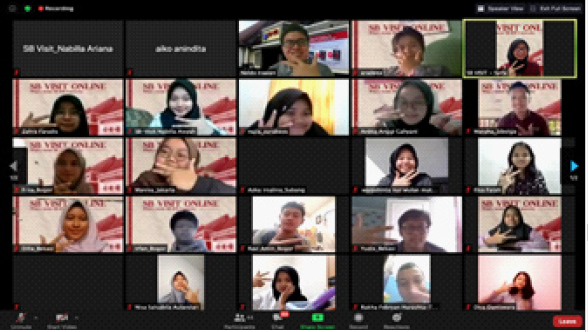
SB VISIT ONLINE BATCH 3 , 2020
SB Visit is an annual activity held by BEM SB-IPB since 2017. This activity in collaboration with the marketing of SB-IPB is specifically for high school students to introduce IPB Business School to them. Due to high demand and requests from students, SB VISIT presents 3 batches starting this year.
The name of this article is:
Batch 3 or the last batch this year will be held on September 26, 2020. Due to the limited quota, this activity was only attended by 49 audiences from various regions, from North Sumatra to Nusa Tenggara. These audiences are not only high school students, but also include audiences from other university faculties who still want to study business as well as parents of students who have an interest in the only Business School in Bogor.
The name of this article is:
This activity is divided into 3 sessions. The first session was filled by Dr. Raden Dikky Indrawan, SP, MM as a lecturer at IPB Business School. This material is filled with current economic and business conditions which are very unstable but have potential and can generate many business opportunities that can be taken by true entrepreneurs. To contribute to this, IPB’s Business School is here to accommodate these future entrepreneurs by its motto, namely Creating New Entrepreneurs and New Ventures.
The name of this article is:
The next session was filled by Neldo Irawan as the IPB Ambassador for Business School in 2019. In this session, Neldo explained to the audience regarding the Business School profile, achievements, facilities, learning, and others. This session was warmly welcomed by the audience with many in-depth questions about IPB University’s Business School. After going through 2 material sessions, the audience was entertained by holding light games with official merch prizes from SB-IPB which were distributed exclusively to the winners with the highest points. Participants who are active during the activity will also receive prizes in the form of OVO balance.
The name of this article is:
The last session was filled by Cindy Taj Queena and Ihsan Fahmi as students of the IPB University Business School. They were present to give testimonials on how SB-IPB lecturers taught, shared business knowledge by providing business consultations, then explained the SB-IPB facilities that were able to meet all student interests and talents, to useful courses to practice while doing business. Cindy and Ihsan also shared their business experiences that they have done, which they are currently operating, and how they are dealing with the current pandemic conditions which also have an impact on their business. The audience’s enthusiasm for this session was very high with many and varied questions.






Recent Comments